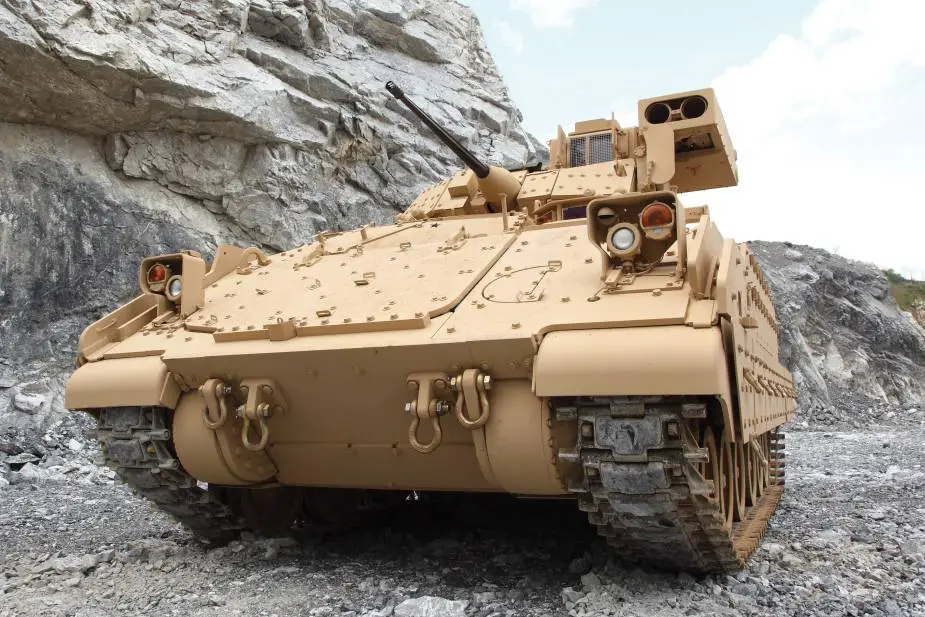US Army advancing first hybrid electric M2A3 Bradley IFV
Designed to transport infantry troops, the Bradley Fighting Vehicle is known for its survivability, mobility and lethality. Now, it can add hybrid electrification to its attributes. Nancy Jones-Bonbrest, Army Rapid Capabilities and Critical Technologies Office, reports on U.S. Army’s website.
Follow Army Recognition on Google News at this link

The Army Rapid Capabilities and Critical Technologies Office (RCCTO) is rapidly prototyping a Bradley hybrid electric vehicle (BHEV) to help inform future hybrid-electric technologies. (Picture source: BAE Systems)
In a first, the U.S. Army turned on its newly integrated hybrid electric Bradley during a demonstration on Jan. 28, marking a major milestone in a rapid prototyping effort. The integrated hybrid electric system will be used to demonstrate that widely available commercial hybrid technology could also benefit the military.
The effort, led by the Rapid Capabilities and Critical Technologies Office, or RCCTO, will help inform future hybrid electric technologies, proving out the effectiveness of the Bradley Hybrid Electric Vehicle and will give Army senior leaders a decision point on whether or not to move forward.
“The BHEV prototype truly has the potential to improve how our soldiers execute their missions while providing the Army with a cost-effective advantage on the battlefield,” said Stanley Darbro, RCCTO Deputy Director. “We’re executing this approach through a 24-month rapid prototyping effort with the expectation it will provide proven increased operational capability for Army-wide application.”
This quick turn prototyping effort is being worked under a Prototype Other Transaction Authority agreement with BAE Systems to deliver two Bradley vehicles retrofitted with hybrid-electric technology. The BHEV consists of an upgraded engine, a transmission replaced by an electric drive motor and the addition of lithium-ion batteries.
During the demonstration, held at BAE Systems’ Sterling Heights facility, engineers demonstrated the BHEV’s ability to power and control critical systems for successful hybrid electric operations. These activities allow BAE Systems to methodically assess each subsystem to ensure proper and safe operations before integrating the next subsystem.
Starting in June, the Bradley vehicles will undergo assessments at Aberdeen Proving Ground, Maryland where they will be driven over rough terrain to measure performance. Then, later this year, both Bradley vehicles will be at Yuma Proving Ground, Arizona for additional field assessments and to compare performance data between the two vehicles, and against non-hybrid electric Bradley vehicles.
Expected benefits of the system include increased onboard power, mobility, lethality options and range. The hybrid technology allows for improved fuel economy and increased range, and improved performance with no added Size, Weight and Power demands. The Army anticipates reduced fuel consumption of 20 percent, and with a smaller number of parts, vehicles with hybrid-electric drive technology should be easier to maintain.
“There’s also the added benefit of silent watch,” said Mike Foster, lead of the RCCTO’s Rapid Acquisition Prototyping Project Office. “It provides a reduced heat signature and sound. Our performance goals are aimed at increasing acceleration, electrical power generation and increased range.”
In addition to the BHEV, the RCCTO is expanding efforts beyond the Bradley to include prototyping hybrid electric Joint Light Tactical Light Vehicles (JLTV) and HMMWVs. Contract awards are expected in February for the HMMWV and in March for the JLTV.


























